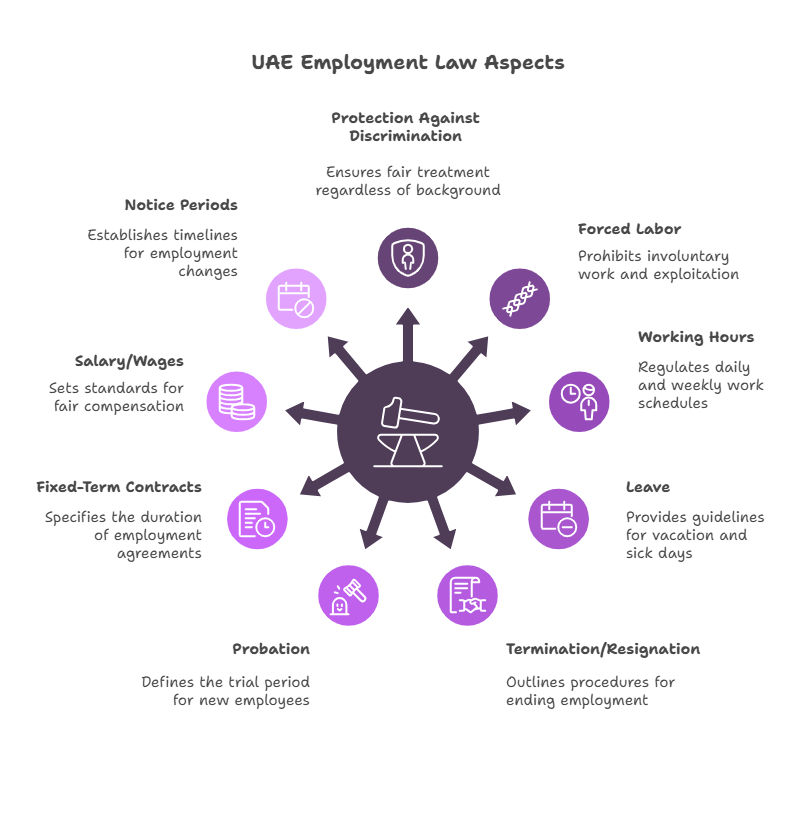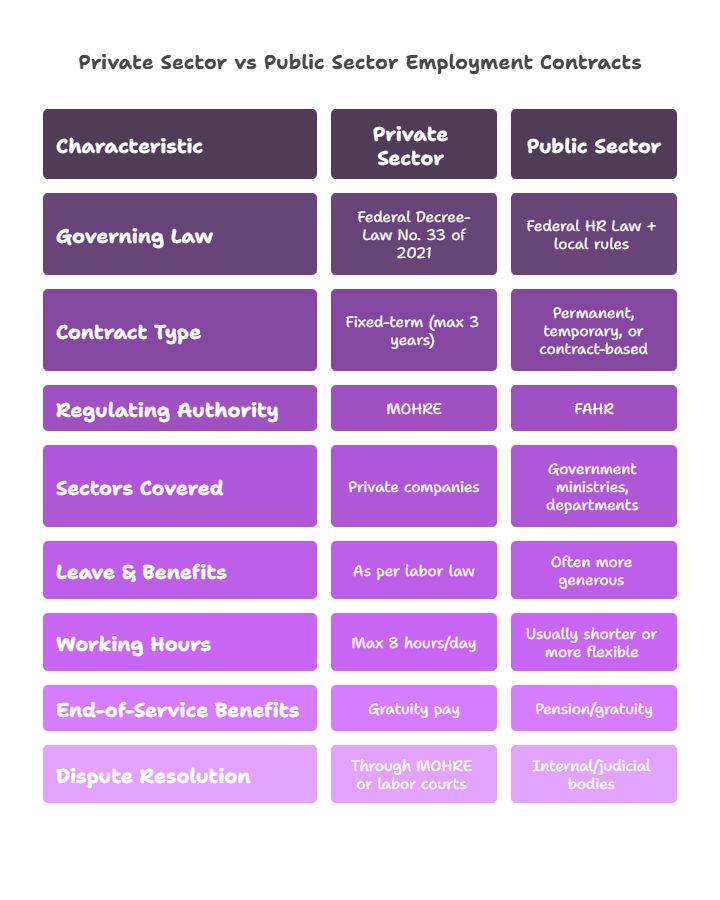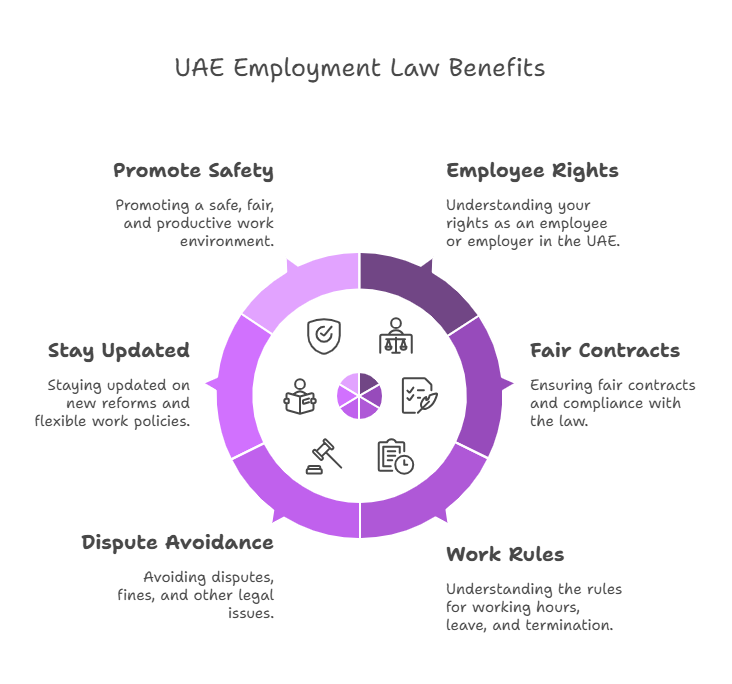Recently, the UAE Employment Law has undergone significant transformation, the majority of which has been positive. Whether you’re an employee who’s trying to understand their rights or you’re an employer figuring out your duties, knowing all of this is more important than ever.
In the last few years, the UAE has introduced many new laws and amendments in order to make the system better and in line with the international standards.
It doesn’t make a difference whether you work in the private sector or the public sector, these laws, rules, and regulations are formed to protect you.
The UAE’s labour legislation has undergone significant changes, particularly after the implementation of Federal Decree-Law No. 33 of 2021. With additional revisions such as Law No. 14 of 2022 and the most recent Law No. 20 of 2023, the system continues to evolve towards a better tomorrow.
Today, we’ll be breaking down the key things of UAE Employment Law in simple terms, without any confusing legal terms and jargon. Contracts, salaries, working hours, termination, harassment, leaves, and everything in between that you need to know.
So, let’s get started.

Types of Employment Laws in the UAE
1. Employment Contracts
The employment contract, which is your formal agreement outlining everything from your job duties to your rights, perks, and termination clauses, is one of the most important components of UAE Employment Law.
Federal Decree-Law No. 33 of 2021 mandates that all employment contracts in the private sector be either limited-term or fixed-term contracts; this has replaced the previous unlimited contracts. Now, the contracts must have a clearly stated time period, although they may be renewed or extended multiple times.
In the UAE, contracts fall into two main categories,
* Private sector employment contracts:
Employment contracts in the private sector are mainly governed by Federal Decree-Law No. 33.
* Public sector employment contracts:
Employment contracts in the public sector are subject to separate rules and regulations under the human resources law of the UAE.
Think about these employment contracts to be the most legally binding agreement between an employer and an employee in the UAE. It establishes your basic salary, your responsibilities, and contains provisions on notice periods, termination, and dispute resolution.

2. Federal Decree-Law Updates (No. 33 of 2021, 14 of 2022, and 20 of 2023)
The Federal Decree-Law No. 33 of 2021 controls all employment connections in the private sector.
- Working hours: Maximum 8 hours per day and 48 hours per week.
- Weekly rest: Mandatory 1 paid day off.
- Rules and regulations about termination, non-compete clauses, probation periods (maximum 6 months).
- Anti-discrimination, anti-harassment, and equal pay for equal work.
Federal Decree-Law No. 14 of 2022:
- This amendment introduced flexible work models, including remote work, part-time, temporary, and freelance employment, reflecting changes in the UAE’s post-pandemic labor market.
- Federal Decree-Law No. 20 of 2023:
- This is the most recent update, it was introduced to provide clarity about notice periods, leave policies, and use of digital platforms for enforcement of labour rights.
3. Regulating Labour Procedures
Got a complaint? Now there’s a clearly defined system in place for this.
The United Arab Emirates labour system has streamlined the way conflicts are resolved:
- Now, employees can submit concerns through the MoHRE’s website or app.
- If the concern remains unsolved, it is referred to the Labour Disputes Committee.
- The law requires prompt resolution and mediation before proceeding to court.
4. Wage Protection System (WPS)
The Wage Protection System (WPS) was implemented to ensure timely salary payments to all private sector employees.
- Employers are required to pay salaries through certified UAE banks.
- Failure to comply results in fines as well as the suspension of the work permit.
A Grievance Committee is also in place to resolve disputes about delayed wages or illegal deductions. This arrangement now includes domestic workers as well.
5. Licensing and Regulating Recruitment Agencies
All the recruitment agencies in the United Arab Emirates must now:
- Be licensed by the MoHRE.
- Provide confirmed and verified job offers and employment contracts.
- Protect the rights of both domestic and international workers.
This guarantees that ethical norms are followed while hiring internationally.
6. Work Permit, Contract, and Job Offer Forms
Whether you’re changing jobs, renewing your visa, or you’re just starting:
- A work permit is compulsory.
- Before a contract may be issued, the employee must sign a job offer letter in both Arabic and English.
- Employment begins only after the contract is registered with the MoHRE.
This protects both the employer as well as the employee under the UAE Employment law.
7. Worker Protection Insurance System
Workers in the UAE are protected under a low-cost insurance plan that includes:
- Compensation for injuries.
- Coverage for unpaid wages or salaries.
- Repatriation expenses in the event of employer default.
This applies to all occupations, from domestic workers to blue-collar professionals.
8. Rules for Domestic Workers
Domestic workers in the UAE now have enhanced labour rights:
- Every week, one day off is mandatory.
- Annually, 30 days of paid leave are granted.
- Twelve hours of rest every day, including eight hours of unbroken sleep.
- Compensation for employment termination without cause.
- Access to complaint mechanisms and legal assistance.
9. Occupational Health and Safety
Workplace safety in the UAE is non-negotiable.
As per UAE policy:
- Employers must offer appropriate safety equipment to the employees.
- Periodic health screenings, particularly in high-risk jobs.
- Serious fines for injuries caused by negligence.
10. Dubai Airport Free Zone Employment Laws
Special economic zones, such as DAFZA, are governed by different laws. However, even here fundamental worker rights apply.
- Contracts must comply with the UAE labour standards.
- The Wage Protection System (WPS) as well as the Worker Protection Insurance System are in place.
- Dispute resolution is conducted by the free zone authorities.
Also Read: List of UAE Public Holidays in 2025
Resolutions & Circulars: 2024 Updates in UAE Employment Law
Now let’s take a brief look at some 2024 updates:
Emiratisation:
- Mandates that private firms (With 50 or more employees within the organization) raise Emirati representation by 2% every year.
- Fines are imposed if the organization fails to comply.
- Training subsidies are provided in order to help and boost national hires.
Domestic Workers:
- New regulations on maximum working hours.
- Employers must offer accommodation and meals.
- The salaries of the employees must be paid monthly via WPS or equivalent.
Fees and Guarantees:
- The fee structure for visa, insurance, and labor cards has been updated.
- Reduced fees for small businesses and startups to encourage hiring.
For Establishments:
- New circulars need regular compliance reporting.
- Labour accommodations must meet the required health standards.
- It’s mandatory for new workers to complete an onboarding orientation.
International Agreements Under UAE Labour Law
The United Arab Emirates has signed multiple global treaties that are in line with the international labour standards.
1. International Agreements:
The UAE works with the ILO and the UN to ensure fair labour standards, migrant worker rights, and protection from exploitation.
2. Hours of Work:
The UAE follows the Hours of Work (Industry) Convention to prevent overworking of employees and provide them with adequate breaks.
3. Equal Remuneration Convention:
The Equal Remuneration Convention promotes equal compensation for equal labour, regardless of gender or nationality, and is a key component of employment law in both the private sector as well as public sectors.
4. Abolition of Forced Labour Convention:
This convention makes it illegal for employers to confiscate passports of the employees or even force overtime.
5. Discrimination (Employment and Occupation):
* Implemented to prohibit discrimination based on race, religion, gender, or nationality.
* It is a part of MoHRE’s anti-harassment and inclusivity initiatives.
6. Minimum Age Convention:
The legal minimum age for employment in the UAE is 15 years, this makes sure that children are protected against child labour.
7. Worst Forms of Child Labour Convention:
This includes strong restrictions and measures in place to prevent children from being exploited.
8. Night Work (Women) Convention:
Even though this has been lifted in many sectors, night shifts for women remain voluntary and must ensure safety and transportation.
Why is it Important to understand the UAE Employment Law?

Whether you’re starting a new career in the United Arab Emirates or you have been here for many years, understanding your rights and regulations at work isn’t just beneficial for you, but it is essential to know this.
Many people sign employment contracts without completely knowing what they’re getting into, this has the potential to lead to a misunderstanding or even major problems later on.
Employment law is not only concerned with what might happen when things go wrong. It’s about knowing what you’re entitled to from the start i.e. your working hours, your salary structure, annual leaves, notice period, and even how to address harassment or conflicts if they arise.
And this is not only vital for the employees but also for the employers, which is why they place equal importance on these laws as well.
Knowing the law allows you to avoid legal difficulties, create trust with your staff, and maintain a fair and professional workplace.
The UAE has taken significant steps in order to protect both employees as well as employers by laying down clear, up-to-date labour laws. When both sides understand the laws, the rules and regulations, things tend to flow more smoothly.
FAQ’s
1. What is the UAE Labour law 2025?
UAE Labour law has been updated with effect from January 1, 2025. Focus on enhancing employee rights, promoting a flexible work environment, and facilitating the hiring of skilled workers. Labour law’s key changes include a revision to termination procedures, flexible work options, and increased protections against harassment and discrimination.
2. What is the new employee rule in the UAE?
As per the new updated labour law rule, employees are protected from bullying and harassment at the workplace as well as discrimination based on religion, gender, nationality, and color.
During pregnancy or maternity leave, a woman cannot be terminated.
3. What is the UAE law for termination?
In the UAE, termination of employment is governed by Federal Decree-Law No. 33 of 2021 and its amendments. Labor law mandates that a Minimum of 30 days written notice is required for termination by either employee or employer. A person can be dismissed without notice under Article 44 if they falsifies documents, commit serious workplace violations, or are absent frequently.
4. What are the new rules to employment visa in UAE?
New Visit Visa for Work Purposes, effective June 30, 2025. Visit visa allows skilled professionals and freelancers to enter the UAE without employer sponsorship for short-term work or job exploration (60/90/120 days). Applicants must meet criteria like holding a Bachelor’s degree or being recent top-university graduates.
Conclusion
Understanding the United Arab Emirates Employment laws, rules, and regulations is much more than simply a legal necessity, it is your right. Whether you are negotiating your base salary, signing a new employment contract, or dealing with issues like termination, working hours, or leave, you now have a clear path.
The UAE has gone a long way since the implementation of Federal Decree-Law No. 33 of 2021 and the subsequent changes in 2022 and 2023 demonstrate an even greater commitment to workplace fairness, flexibility, and transparency.
So, whether you are a worker or an employer, use and apply this knowledge. Protect your rights. Respect your responsibilities. Also, make sure that the language of the Employment law in UAE becomes second nature as you progress through your career in the United Arab Emirates.




